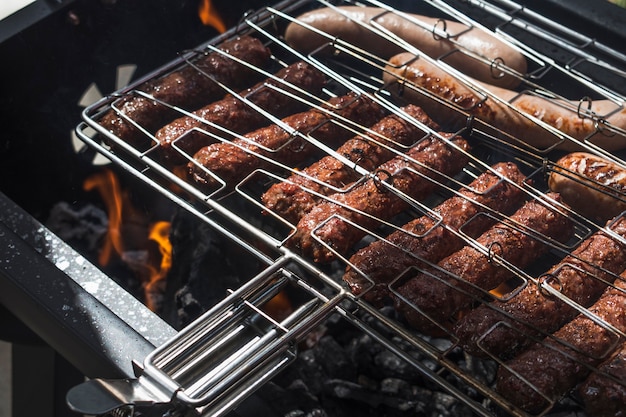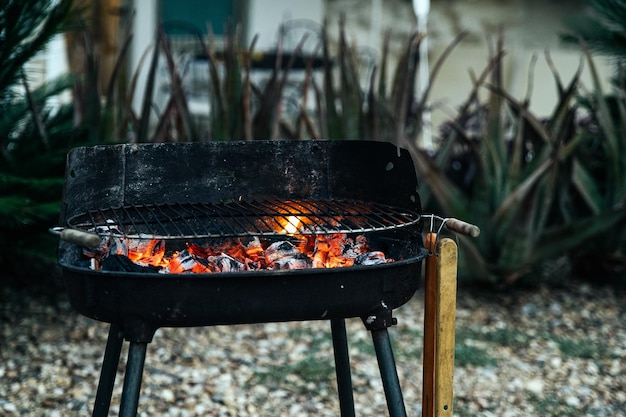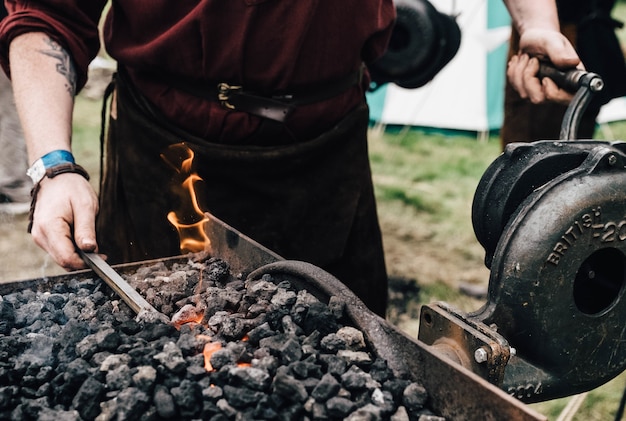Is it better to BBQ with charcoal or wood?
When it comes to hosting a barbeque, one of the key decisions you need to make is whether to use charcoal or wood as your fuel source. Both options have their own distinct advantages and characteristics that can affect the flavor and overall experience of grilling. In this article, we will explore the pros and cons of each method to help you determine which one is better suited for your next outdoor cooking adventure.
The Charcoal Debate
Charcoal has long been a popular choice for barbeques due to its convenience and ease of use. It provides a consistent and predictable heat source, making it ideal for beginners or those who prefer a hassle-free grilling experience. Charcoal briquettes are readily available in stores, easy to ignite, and burn steadily for a relatively long time.
On the other hand, some argue that using charcoal can impart a subtle chemical taste to the food. This is mainly attributed to the additives and binders present in many commercial charcoal products. However, if you opt for natural lump charcoal, which is made from pure hardwood, you can avoid this issue and enjoy a cleaner, more authentic flavor.
The Benefits of Wood
If you are looking to take your barbeque to the next level, consider using wood as your fuel source. Cooking with wood can infuse your food with incredible smoky flavors that are difficult to replicate with any other fuel. Each type of wood brings its unique aroma and taste profile, allowing you to experiment and create exciting flavor combinations.
Another advantage of using wood is the ability to control the intensity of the smoke. By adjusting the airflow and temperature, you can achieve a gentle smokiness or a bold, robust flavor, depending on your preference. This level of customization is highly valued among barbeque enthusiasts and pitmasters.
Which One to Choose?
Ultimately, the question of whether it is better to BBQ with charcoal or wood depends on your personal preferences and the specific occasion. If you prioritize convenience, consistency, and a simpler grilling experience, charcoal might be the way to go. On the other hand, if you are passionate about experimenting with flavors, enjoy the process of tending to the fire, and want to achieve that authentic smoky taste, wood is worth considering.
“Cooking with wood can infuse your food with incredible smoky flavors that are difficult to replicate with any other fuel.”
Whichever option you choose, remember that proper heat management and cooking techniques play an essential role in achieving delicious results. Practice and experimentation will help you discover your preferred method and allow you to elevate your barbeque skills to new heights.
Why use charcoal instead of wood?
Charcoal has been used as a fuel source for centuries. It is a carbon-rich material that is created by burning wood in a low-oxygen environment, resulting in a substance that burns cleaner and more efficiently than regular wood. In the UK, charcoal is gaining popularity as an alternative to wood for various reasons.
1. Improved Burning Efficiency
One of the main advantages of using charcoal is its superior burning efficiency compared to wood. Charcoal burns at a higher temperature and produces less smoke, making it ideal for grilling and barbecuing. It also provides a longer-lasting heat, ensuring that your food is cooked evenly and thoroughly.
2. Cleaner and Smoke-Free
When using charcoal, you’ll notice a significant reduction in the amount of smoke produced compared to burning wood. This makes charcoal a more environmentally-friendly option, as it releases fewer pollutants into the air. Additionally, the lack of smoke means a cleaner cooking experience, with less risk of your food being tainted with a smoky flavor.
3. Consistent Heat and Flavor
Charcoal provides a consistent and controlled heat source, allowing you to have greater control over your cooking process. Whether you’re grilling a steak or smoking a rack of ribs, charcoal delivers a steady heat that helps achieve the desired results. Furthermore, charcoal imparts a unique smoky flavor to your food, enhancing the taste and aroma.
4. Versatile Uses
Charcoal can be used for more than just grilling and barbecuing. It is also commonly used in water filtration systems, as it has the ability to absorb impurities and improve water quality. Additionally, charcoal is a key ingredient in certain skincare products due to its natural detoxifying properties.
In conclusion, charcoal offers numerous advantages over wood when it comes to fuel sources. From improved burning efficiency and cleaner emissions to consistent heat and unique flavor, charcoal is becoming the preferred choice for many in the UK. So next time you fire up the grill or need a natural filtration solution, consider using charcoal instead of wood.
Advantages of Burning Charcoal over Burning Wood
When it comes to outdoor cooking or heating, many people often face the dilemma of choosing between burning charcoal or burning wood. While both options have their merits, burning charcoal offers several distinct advantages over burning wood.
1. Longer Burning Time
One of the main advantages of burning charcoal is its longer burning time compared to wood. Charcoal is created by burning wood in a low-oxygen environment, which removes moisture and other impurities, resulting in a more concentrated fuel source. As a result, charcoal burns at a higher temperature and for a longer duration than wood. This makes it ideal for activities such as barbecuing, where consistent heat over an extended period is required.
2. Cleaner and More Controlled Burn
Burning charcoal produces less smoke and ash than burning wood, resulting in a cleaner and more controlled burn. The high carbon content in charcoal ensures efficient combustion, reducing the amount of smoke emitted during the burning process. This is particularly advantageous for those concerned about air pollution or living in urban areas where smoke may cause discomfort to neighbors.
“Burning charcoal offers longer burning time and produces less smoke and ash compared to wood.”
Moreover, charcoal produces less residual ash as it burns, minimizing the need for frequent cleaning or maintenance. This ease of use and cleanliness make charcoal an attractive option for individuals looking for a hassle-free fuel source.
In Conclusion
While both charcoal and wood have their benefits, there are clear advantages to burning charcoal over wood. Its longer burning time and cleaner, more controlled burn make charcoal a popular choice for outdoor cooking and heating. However, it’s important to consider personal preferences and specific use cases when deciding between the two options.
Is it Better to Cook with Charcoal or Propane?
The Debate: Charcoal vs. Propane
When it comes to grilling, the choice between charcoal and propane has been a long-standing debate among BBQ enthusiasts. Both methods have their advantages and drawbacks, so it ultimately comes down to personal preference. Let’s take a closer look at the pros and cons of cooking with each fuel type.
Charcoal: The Traditional Favorite
Cooking with charcoal imparts a unique smoky flavor that many grill masters rave about. It provides a more authentic grilling experience and can reach higher temperatures, making it ideal for searing meats. Charcoal grills are also generally more affordable than their propane counterparts, with a wider range of options available. However, using charcoal requires more time and effort, as you need to light and wait for the coals to heat up.
Propane: Convenience and Control
On the other hand, propane grills offer convenience and ease of use. With just a twist of a dial, you can quickly ignite the grill and start cooking. Propane also provides consistent heat, allowing for precise temperature control. This makes it ideal for those who want to cook food quickly and efficiently. Additionally, propane grills are generally easier to clean and maintain compared to charcoal grills.
The Verdict: Choose What Works for You
Ultimately, the decision between charcoal and propane comes down to personal preferences and priorities. If you value the smoky flavor and traditional grilling experience, charcoal is the way to go. On the other hand, if convenience, speed, and temperature control are important factors for you, then a propane grill may be the better choice.
“There’s no right or wrong answer when it comes to charcoal versus propane – it’s all about what you enjoy and what works best for your grilling style.”
Regardless of your choice, the most important thing is to grill safely and enjoy the process of cooking delicious food outdoors.
What Tastes Better: Propane or Charcoal?
One of the age-old debates in the world of grilling is whether propane or charcoal produces better-tasting food. Both options have their dedicated fans, but let’s break down the factors that might influence the taste between the two.
Propane Grills
Propane grills offer convenience and quick heat-up times. They are easy to use and control, making them a popular choice for many UK grill enthusiasts. The clean-burning fuel of propane produces consistent heat, resulting in evenly cooked food. However, some argue that the lack of smoky flavor from burning charcoal can impact the taste of the food.
Charcoal Grills
Charcoal grills are synonymous with smoky flavors that many people crave in their barbecued meals. The charcoal briquettes or lump charcoal used in these grills impart a distinct taste and aroma to the food. The high heat produced by charcoal also sears the meat, creating a delicious crust. However, charcoal grills require more time and effort to set up and maintain compared to propane grills.
Personal Preference
Ultimately, the choice between propane and charcoal comes down to personal preference. Some individuals prefer the convenience and ease of propane grills, while others enjoy the traditional smoky flavors provided by charcoal grills.
Regardless of your choice, it’s important to note that proper grilling techniques, seasoning, and marinating play a significant role in enhancing the taste of your grilled dishes.
To determine what tastes better for your palate, you may want to consider hosting a taste-testing event with friends or family. Grill the same type of food using both propane and charcoal grills, and ask participants to share their opinions.
Can you use wood in a charcoal grill?
When it comes to grilling, charcoal has long been the preferred fuel choice for many BBQ enthusiasts. But what about using wood instead? Can you use wood in a charcoal grill? The answer is yes, and it can actually enhance the flavor of your food.
Using wood chunks or chips
If you want to infuse your grilled dishes with a smoky flavor, adding wood chunks or chips to your charcoal grill is a great option. Wood chunks are larger pieces of wood that burn slower and produce more smoke, while wood chips are smaller and burn quickly.
Pro tip: Soak the wood chips in water for approximately 30 minutes before adding them to the grill. This will help create more smoke and prevent them from burning too quickly.
Whether you’re cooking steak, chicken, or vegetables, using wood chips or chunks can add a delicious smoky taste to your food. Just scatter a handful of soaked wood chips over the lit charcoal, close the grill, and let the smoke work its magic.
Choosing the right type of wood
When using wood in your charcoal grill, it’s important to choose the right type of wood for the flavors you desire. Different types of wood impart different flavors, so consider experimenting with various options to find your favorite combination.
Pro tip: Mesquite wood is known for its strong and robust flavor, making it ideal for grilling red meats. Fruitwoods like apple, cherry, or pecan can add a subtle and slightly sweet flavor that pairs well with poultry and fish.
Using wood in a charcoal grill allows you to customize the flavors of your grilled dishes, adding depth and complexity to your meals. It’s a fantastic way to elevate your BBQ game and impress your guests.
Here are some popular wood choices for grilling:
| Wood Type | Flavor Profile | Best for Grilling |
|---|---|---|
| Mesquite | Strong, bold, and smoky | Beef, lamb |
| Hickory | Rich, bacon-like flavor | Pork, ribs |
| Apple | Light, fruity, and slightly sweet | Poultry, fish |
Remember to start with a small amount of wood and adjust according to your taste preferences. You can always add more wood for a stronger smoky flavor or use a combination of different woods for a unique blend.
In conclusion, using wood in a charcoal grill is a fantastic way to enhance the flavor of your grilled dishes. Experiment with different types of wood to find the perfect combination that suits your taste preferences. Soak wood chips before adding them to the grill to ensure a steady release of smoke. Get ready to impress your friends and family with deliciously smoky BBQ!
Conclusion
Ultimately, the taste difference between propane and charcoal is subjective. While charcoal grills are often associated with smokier flavors, propane grills can still produce delicious and perfectly cooked meals. It’s all about experimenting, finding your preferred grilling method, and enjoying the experience of cooking outdoors.


